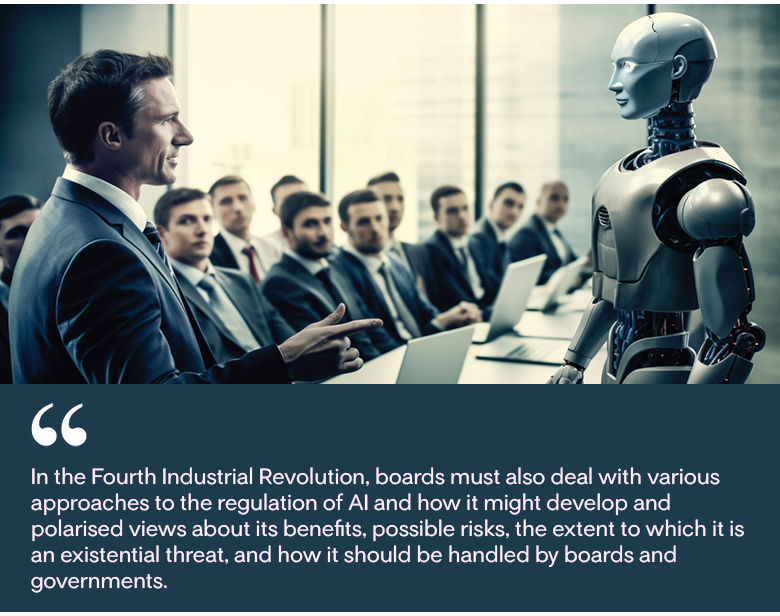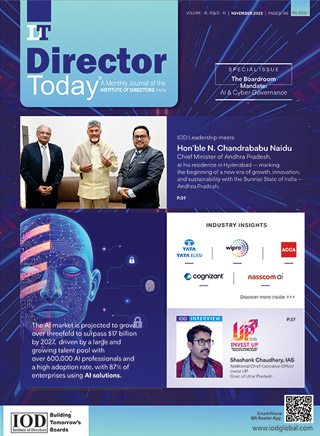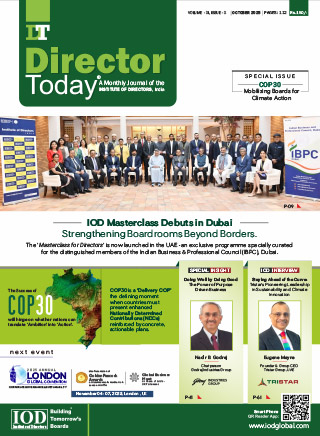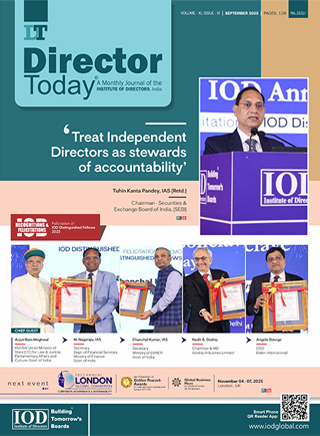Responsible Board Leadership and AI Impacts

Reconciling possible short-term gain with longer-term sustainability
Countries, boards and executive teams around the world are grappling with rapid developments across a range of technologies, the combined impacts of which could be so profound that many consider a fourth industrial revolution is underway. Terms such as 'Industry 4.0' have been used to distinguish it from the digitally driven third industrial revolution. Invariably boards focus upon implications, opportunities and potential competitive advantages for their own companies in this new era that is unfolding.
Governments too look first for ways of enhancing national competitiveness, winning races to host new data centres, and sometimes, as in the USA, removing regulatory and other barriers to the adoption of new technologies such as artificial intelligence (AI). Their concern is often to avoid being left behind, rather than with social and sustainability consequences. Summits to consider wider AI impacts have been held at Bletchley Park, UK, in Seoul, South Korea and in Paris, France. The next AI Impact Summit is to be hosted by India in New Delhi.
The efficiency benefits of the fourth industrial revolution and 'Industry 4.0' are actively promoted by providers of AI and its enabling technologies.
Governments compete to secure mega data centre project inward investments from technology giants. The AI Impact Summit in February 2026 will be concerned with responsible collaboration and adoption of enabling technologies for inclusive, socially beneficial and sustainable outcomes. What role should boards play in ensuring the future welfare of their companies, stakeholders and the planet?
Responsible Technology Adoption
Regulation and government intervention can be blunt instruments and lead to negative and unintended consequences when and where there is a diversity of requirements, situations and circumstances. Marketbased initiatives may have an environmentally positive impact. The world's first particulate-matter emissions market, which covered industrial plants in a large city in Gujarat has reduced pollution emissions and abatement costs. Responsible innovation and enterprise may be a better route to inclusive and sustainable growth and development.
Responsible leaders and boards recognise the risk of negative externalities from human activities. They act to contain, minimise or reverse them, whether unintended consequences or unwelcome collateral damage. Boards can encourage, enable and support the exploration of benign possibilities, favourable alternatives, different and more beneficial scenarios, and responsible enterprise and entrepreneurship.
But what about AI?
Are boards reacting to trends and events, rather than exercising foresight, reading the road ahead and being proactive?
Directors should anticipate who and what might be impacted by AI and other trends and developments. Opportunities for learning, responsible innovation and sustainable entrepreneurship should be actively sought. Challenges, risks and threats are often inter-related. Boards should encourage simultaneous pursuit of multiple objectives, for example environmental initiatives that improve air and water quality, enhance health and well-being, provide climate mitigation and increase community resilience to extreme weather events.
With AI there are risks and threats as well as benefits to consider. There are many ways in which it can be used by malevolent actors, whether for criminal purposes or hybrid warfare, and to accelerate the development of biological, nuclear and/or other weapons. Generative and other AI applications can be used to overcome cyber defences and by authoritarian regimes to extend surveillance and control and undermine liberal democracies. Agentic AI increases vulnerabilities and like other emerging forms of AI can be difficult to control.
Responsible Board Leadership
Forward-thinking boards avoid hype, confront realities, adapt governance strategies, fortify resilience, and lead responsibly to navigate uncertainty, seize emerging opportunities, safeguard long-term sustainability and ensure our collective survival. Rather than creating demand, seeking ever more, and over consumption, could satisficing, sufficiency and producing just enough to meet core needs or minimum requirements be a more sustainable strategy? Should directors be responsible moderators rather than unbridled maximisers?
Responsible boards avoid practices such as built-in obsolescence, the premature ending of product lines, and sales commissions that encourage over-selling. Instead, they drive sufficiency, build their confidence to operate, initiate, innovate and cooperate in an era of multiple pressures and uncertainties in which many people feel powerless and marginalised. Boards should have the courage to ensure that growth is inclusive and sustainable, the will to identify and tackle negative externalities, and the imagination to pursue sustainable options.

Directors should act in the best long-term interests of companies and their stakeholders, ecosystems and those who do not have a voice. If adverse consequences and negative externalities were discussed, would more investors be prepared to accept lower profits, and might further customers pay a premium to reduce them? Would stakeholders be willing to adopt different measures of achievement and progress that are not illusions, but supportive of life and what is affordable and attainable within the limits of the earth's eco-systems?
With the large and growing negative externalities of its use, including the energy, water and rare earth demands of its enabling data centres, and risks of loss of control, AI represents an existential threat. It is promoted and widely adopted as a consumer product, and its regulation varies greatly across jurisdictions. What can an individual board do to ensure the principle of sufficiency applies to AI adoption? Is collective, government and international agreement on priorities required? How might this be achieved at the 2026 AI Impact Summit?
Confronting Changeable Headwinds
When endeavouring to make progress in what they feel is the right direction, boards sometimes confront unwelcome headwinds that appear to be carrying others before them. On occasion, certain stakeholders and directors may suggest following the herd, especially when maintaining forward momentum is challenging and incurs short-term costs. How should a board handle and respond to the question of whether to change course, or persist and tack to proceed towards a previous destination such as 'net-zero' emissions?
The re-election of Donald Trump for a second term as President of the USA poses challenges and dilemmas for many boards, on account of the economic and political disruption, uncertainty and unpredictability, and the risks, insecurity and vulnerability it is causing for businesses and governments around the world. Trump challenges established conventions, practices and institutions with the energy and purpose one might expect from the radical left extremists he criticises. There are governance and sustainability consequences.
For his US big business, fossil fuel and high-tech backers, Trump has set out to de-regulate, remove environmental restrictions, encourage 'light touch' regulation of AI, and pursue 'America First' policies. In time, this could mean fewer reporting and other requirements for US companies and more presidential pressures on certain boards to tow a 'Trump' line. Measures introduced by a climate change denying President to benefit fossil fuel companies could set back progress towards net-zero and increase climate risks for people worldwide.
The forthcoming 2026 AI Impact Summit faces the challenge of reconciling disparate and contending interests and viewpoints, against the background of an insecure and unpredictable context in which hybrid and hot wars are underway, current activities and lifestyles are unsustainable, and affordable resources are limited and unequally owned.
Surviving the Switch from AI to AGI
AI has been an accelerator of the digital revolution, and its rapid development is fuelling speculation about its impact on transition to the fourth industrial revolution and whether the emergence of Artificial General Intelligence (AGI) will affect its trajectory, impacts and how it should be handled and regulated. As and when applications of AGI can begin to reason and problem solve better than many humans, various white-collar jobs may be lost. Professionals who previously worked with AI might be replaced by AGI. Social impacts could be profound.
We have evolved over millennia to cooperate and interact with others. Many people find meaning in their work. It may define for them and others who they are. They obtain the comfort and satisfaction of belonging and contributing. Already many lonely individuals are retreating into virtual worlds with friendship bots taking the place of human company. The loss of more interpersonal contact could undermine social cohesion, widen the division between opportunity haves and have nots, and weaken communities and societies.
As higher level and creative work is undertaken without humans and the ranks of the 'unwanted' and marginalised grow, the insecurity of others, loneliness, and isolation may further increase. Those seeking human companionship, meaning and fulfilment, and without the prospects that can derive from being socially connected, represent a potential source of instability. They may feel or be persuaded that they are victims and that 'others' are gaining at their expense. In time the excluded may revolt. Disorder and social breakdown could result.
Corporate and Government Challenges
Companies operating internationally, and in both the US and EU, must now cope with very different approaches to ESG and DEI, while both corporate and political leaders can face new tariff barriers. These might be high enough to affect the viability of different courses of action yet may change at a moment's notice on a US presidential whim. Uncertainty and unpredictability complicate supply chain management and investment, and re-location decisions, when justifications for them may disappear before they can be implemented.
In the fourth industrial revolution, boards must also deal with various approaches to the regulation of AI and how it might develop and polarised views about its benefits, possible risks, the extent to which it is an existential threat, and how it should be handled by boards and governments. Many companies do not train their people how to use AI or prepare them for working with it, or being replaced by it, as it evolves and develops. Negative externalities are ignored and retraining and alternatives are not provided.
Younger generations who have grown up with AI tools may use them for companionship and support. In a world in which AI applications may perform better than humans at a growing range of tasks, people may not develop the skills needed for critical thinking, ethical judgements and human inter-action. They may not be able to identify misrepresentation or experience the joy of personal exploration, discovery and surprise. They might become dependents, radicalised or polarised, or sedated by algorithms, and contribute little to society.
Boards' Role and Responsibilities
There are ethical, responsibility, security and sustainability issues to address, and opportunity costs and negative consequences as well as potential benefits to consider. The establishment and operation of the large data centres that enable AI and AGI use can put a strain on energy, water, and other resources needed elsewhere. Organizations need to determine who has the authority to govern intelligent choice environments where human judgment and AI intersect if both machine intelligence and human judgment are to be responsibly utilised.
The adoption and further use of generative AI and widely available tools can result in additional infrastructure, compliance and specialist support costs. Basic steps to take could include actions to secure confidential information, such as policies to prevent the upload of corporate information to widely available consumer AI tools. The use of autonomous AI agents may speed up responses and save costs, but it may be wise to ensure human oversight and use them for less important tasks, lest they stray into new areas beyond foreseen limits.
Directors are not always aware of risks associated with their own use of AI and the extent to which data may need to be structured and formatted differently for machine and human use. Boards should ensure that both corporate and personal use of AI is responsible, sustainable and justifiable when negative externalities are considered. Confidentiality policies should cover the use of corporate data on AI tools acquired privately by individuals. Applications that cause or compound environmental and social harm are avoided by responsible boards.
2026 AI Impact Summit
Rapid advances in military applications of AI raise the spectre of swarms of affordable and autonomous drones released by bad actors seeking out and eliminating people and the critical infrastructure upon which human life depends. Liberal democracies may find it increasingly difficult to protect their citizens against such threats and the advance of authoritarianism. Boards of companies within supply chains may need to be vigilant over the use of what is produced and supplied and alert to negative environmental and social consequences.
The forthcoming 2026 AI Impact Summit faces the challenge of reconciling disparate and contending interests and viewpoints, against the background of an insecure and unpredictable context in which hybrid and hot wars are underway, current activities and lifestyles are unsustainable, and affordable resources are limited and unequally owned. Our prospects for collective survival will depend upon whether key players recognise their own vulnerabilities and put longer-term resilience and sustainability ahead of opportunities for short-term gain.
Author

Prof. Colin Coulson-Thomas
Director-General of IOD India for UK and Europe operations
Prof. (Dr) Colin Coulson-Thomas, President of the Institute of Management Services and Director-General of IOD India for UK and Europe operations. He has advised directors and boards in over 40 countries.
Owned by: Institute of Directors, India
Disclaimer: The opinions expressed in the articles/ stories are the personal opinions of the author. IOD/ Editor is not responsible for the accuracy, completeness, suitability, or validity of any information in those articles. The information, facts or opinions expressed in the articles/ speeches do not reflect the views of IOD/ Editor and IOD/ Editor does not assume any responsibility or liability for the same.

 Quick Links
Quick Links
 Connect us
Connect us




 Back to Home
Back to Home





























